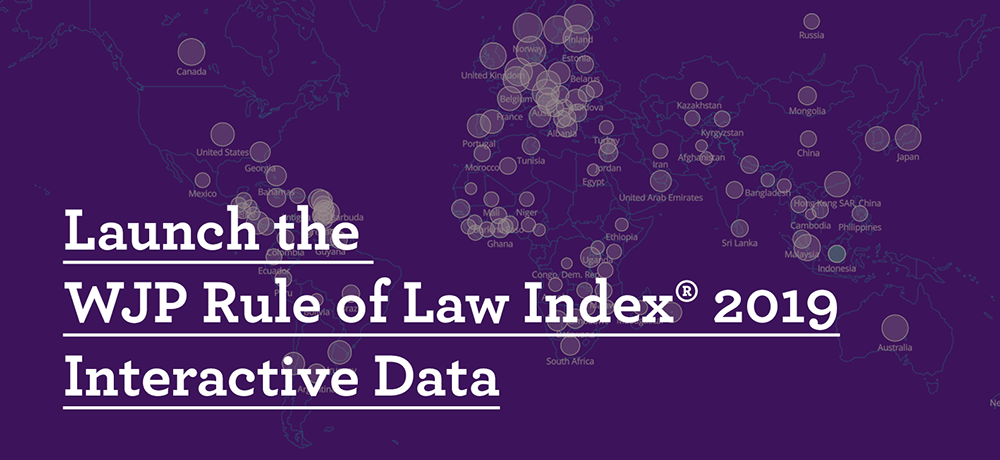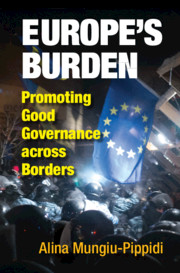 More countries declined than improved in overall rule of law performance for the second year in a row, continuing a negative slide toward weaker rule of law around the world, according to the new World Justice Project Rule of Law Index:
More countries declined than improved in overall rule of law performance for the second year in a row, continuing a negative slide toward weaker rule of law around the world, according to the new World Justice Project Rule of Law Index:
In a sign suggesting rising authoritarianism, the factor score for “Constraints on Government Powers” declined in more countries than any other factor worldwide over the last year (61 countries declined, 23 stayed the same, 29 improved). This factor measures the extent to which, in practice, those who govern are bound by governmental and non-governmental checks such as an independent judiciary, a free press, the ability of legislatures to apply oversight, and more. Over the past four years, Poland, Bosnia and Herzegovina, and Serbia have lost the most ground in this dimension of the rule of law.
 The second largest decline was seen in the area of “Criminal Justice,” followed by “Open Government” and “Fundamental Rights.” On the positive side, more countries improved in “Absence of Corruption” than declined for the second year in a row, WJP adds.
The second largest decline was seen in the area of “Criminal Justice,” followed by “Open Government” and “Fundamental Rights.” On the positive side, more countries improved in “Absence of Corruption” than declined for the second year in a row, WJP adds.
The top three overall performers in the 2019 Index were the Nordic states of Denmark (1), Norway (2), and Finland (3), while the Democratic Republic of the Congo (124), Cambodia (125), and Venezuela (126) were anchored at the bottom.
The findings echo the concerns raised in this year’s Seymour Martin Lipset lecture, sponsored by the National Endowment for Democracy, by Alina Mungiu-Pippidi, author of Europe’s Burden: Promoting Good Governance Across Borders. They also confirm the trends identified in the annual “Freedom in the World” report from Freedom House, notes one analyst.
The rise of autocracy  and right-wing populism, its western democratic cousin, gives rise to understandable concern that liberal political values and the rule of law are heading towards terminal decline, the FT’s Tony Barber observes. However, neither autocratic states such as China and Russia nor rightwing populist leaders in the US, Italy and other western countries have had everything go their way in 2019. Their mixed fortunes suggest that it is premature to write off the prospects for global governance, even though the rules-based order constructed after 1945 largely to US specifications is decomposing and will never return in its old form, he writes:
and right-wing populism, its western democratic cousin, gives rise to understandable concern that liberal political values and the rule of law are heading towards terminal decline, the FT’s Tony Barber observes. However, neither autocratic states such as China and Russia nor rightwing populist leaders in the US, Italy and other western countries have had everything go their way in 2019. Their mixed fortunes suggest that it is premature to write off the prospects for global governance, even though the rules-based order constructed after 1945 largely to US specifications is decomposing and will never return in its old form, he writes:
However, the most important long-term trends in international relations over the past 30 years have been the rise of China and the accelerating shift of economic power from the west to the Asia-Pacific region. This in itself ensures that the Washington-designed post-1945 order, built mainly for the benefit of the US, Europe, Japan and their allies, will give way to a more dispersed form of global governance. For the west, the cold reality is not that autocracy will triumph and democracy will fail, but rather that the 500-year-long era of western global supremacy is coming to an end. RTWT
“One of the most striking things about the degradation of the rule of law is that it is being effected through laws and legal institutions. The law itself is being hijacked and used to erode checks on power,” says Elizabeth Andersen, WJP’s executive director.
*Drawing on primary data, the WJP Rule of Law Index measures countries’ rule of law performance across eight factors: Constraints on Government Powers, Absence of Corruption, Open Government, Fundamental Rights, Order and Security, Regulatory Enforcement, Civil Justice, and Criminal Justice.

 We Americans were, not so long ago, among the proud guarantors of the liberal system. Democrats boasted we were the “Indispensable Nation.” Republicans were fond of proclaiming us as an “Exceptional Nation,” the centerpiece of global stability…. In contrast, the authoritarian powers are brimming with self-confidence about how they intend to lead—through “re-education” camps, Great Firewalls, the surveillance state, occupations and annexation of other peoples’ lands, ethnic cleansing, and murders of journalists.
We Americans were, not so long ago, among the proud guarantors of the liberal system. Democrats boasted we were the “Indispensable Nation.” Republicans were fond of proclaiming us as an “Exceptional Nation,” the centerpiece of global stability…. In contrast, the authoritarian powers are brimming with self-confidence about how they intend to lead—through “re-education” camps, Great Firewalls, the surveillance state, occupations and annexation of other peoples’ lands, ethnic cleansing, and murders of journalists.





